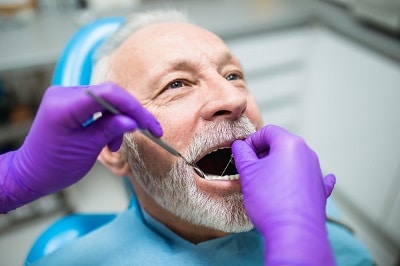by: Sarah Morris
Dental care is often neglected by many for different reasons. Most people brush off dental care because of the need to go to dentists. A lot of people are actually afraid of going to the dentist and refuse dental care altogether even if they need them. What’s alarming, however, is that a lot of people, especially seniors, actually need proper dental and oral care. If you’re an older adult or someone who knows an older adult, this article can hopefully enlighten you to pay closer attention to your overall dental health. 
Are you aware that by 2060, adults in the United States who are 65 and older will comprise 24% of the population? That is equivalent to 98 million older adults. Nearly 20% have completely lost their teeth, and it is twice as prevalent among seniors beyond age 75. Unfortunately, these can cause a lot of problems – including difficulty speaking, digesting food, or even just the fact of appreciating everyday meals.
If you’re handling a senior’s care, especially if you strive to help them become more independent, proper dental care should be a part of your care plan.
Seniors and Dental Care: What are the Statistics?
The above are just some of the hard numbers you ought to be aware of when it comes to seniors and their dental health. If you are in Florida, a Farnham Family Jacksonville Dentist can help you or a senior you know to meet your dental health needs.
Here are some more statistical facts about dental health among seniors that you may want to know:
- Dental cavities in permanent teeth: A total of 93% of older adults who are at least 65 years old have had dental cavities in permanent teeth. While this is a popular subject in toothpaste advertisements, cavities do pose a significant threat that may hinder an elderly person’s enjoyment and satisfaction with their everyday lives. This is especially given cavities can cause not only tooth loss, but pain as well. Remind seniors in your care that they should prioritize brushing their teeth and using dental floss, especially if they’re able to do so. If they need assistance from you, strive to make sure brushing their teeth is part of your routine.
- Tooth loss: It might be of interest to note that older adults over 65 years old have an average of 18.90 remaining teeth. If seniors under your care have dentures, be sure to help them clean the dentures properly and have them checked regularly, especially if they’re due for replacements. Try to make sure your seniors are given proper means to care for them as well to maintain their durability.
- Treatment needs: While the nature of oral health has improved over the past few years, 23% of older adults over 65 have yet to see a doctor in the last five years. In fact, only around 50% of seniors in this age group have visited the dentist within the past year. While a lot might find dental visits trivial, it’s extremely important
 seniors under your care have their visits to the dentist regularly. Aside from mitigating the above, this will also allow you and the dentist to find ways to treat early stages of other dental issues before they can hinder the daily lives of seniors under your care.
seniors under your care have their visits to the dentist regularly. Aside from mitigating the above, this will also allow you and the dentist to find ways to treat early stages of other dental issues before they can hinder the daily lives of seniors under your care. - Periodontal disease: While the prevalence of periodontal or gum disease in older adults has decreased, there are still some disparities in some groups. For instance, 17.20% of older adults aged 65 and above actually have periodontal disease, and 10.58% of the same population group have moderate to severe versions of the disease. If you have seniors under your care, do encourage them to stop smoking as this is a cause of periodontal disease. Encourage them or aid them in practicing their oral health maintenance properly, especially with the assistance of a dentist’s advice.
- Oral cancer: Around 49,700 people in the United States are diagnosed with oral cancer, a disease that affects both the pharynx and/or the mouth. While not a lot of seniors have oral cancer, it’s still important to make sure you’re on top of your game to help them avoid situations that may lead to this. Aside from practicing good oral health habits, you should make sure they get regular visits to the dentist, and you’re aware of dental conditions that may hinder with their daily lives.
Dental Care, And How It’s Helping Your Seniors With Independence
A lot of people tend to dismiss the idea of dental health because of a lot of things. Some of these include being afraid of dentists, or thinking they can take care of their teeth in general. However, if the above were to be put into consideration, it’s important to remember that when dental health care is neglected with seniors, it can have consequences to their quality of life.
- If possible, try to check with your healthcare provider if there’s things in place to help promote the provision of dental health care options for the seniors under your care. These range from free checkups to convenience in terms of getting medicine and aid for particular concerns. If not, try to see if there’s a way for you to apply for these. This at least provides you with a mechanism to help seniors in your care.
- As a caretaker, it’s important to remember there’s actually ways improper dental care can be an inconvenience to the seniors under your care. These include not only pain and discomfort, but even an inability to speak or eat – which can severely hinder them from doing tasks they normally do everyday. Also try to be aware of symptoms of things such as oral cancer, so you can seek help immediately.
- As a caretaker, it’s important to prioritize your seniors’ dental care primarily because it serves a major role in helping them consume food to keep them healthy and strong. We have to make sure mechanisms that support this continue to work so they won’t be inconvenienced. These include proper maintenance of dentures, cleaning of teeth, and making sure their mouths don’t have risky infections.
- It’s also important to coordinate with the dentist in this regard, as their advice can be extremely important while seniors under your care are growing. They can make adjustments to particular routines and give advice on what certain medicine or treatments to do in order to maximize comfort and care.
Conclusion: Dental Care Matters Across All Ages
With the above numbers in mind, it helps to understand that taking care of your teeth isn’t just something you do when you have the time or when there’s trouble brewing in your oral health. Regardless if you have cavities, toothache, or just an “ordinary” and “painless” day, it helps to make your conversations and appointments with your dentist part of your routine. As an older person or as someone who knows an older person, it also helps to be familiar with these statistics to remember just how important dental health is for a person to be able to perform a lot of daily tasks properly.